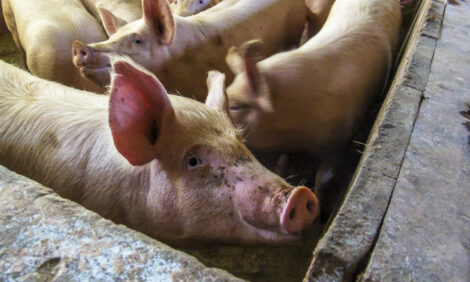



Pork on the wild side
UK - Livestock farmers Neil and Susan Adams found the road to farming success – with the help of their English pointer, Joe. The couple were considering the best way to make a living on 12 acres of land at Blue Tile Farm, Brampton near Beccles in Suffolk when Joe decided to make an unscheduled visit to a neighbouring farm.
|
The neighbours bred pure wild boar and Neil and Susan ended up buying all their livestock and starting a new venture, Brampton Wild Boar.
Neil and Susan produce a wide range of tasty products from roasting joints to bacon, Parma-style ham and six different flavours of sausages, selling at farmers’ markets and to restaurants, butchers and farm shops.
A growing business
 They are now moving the business forward and in the process of setting up an operation where they can prepare hams, bacons and pate for other farmers wishing to take their produce to farmers’ markets.
They are now moving the business forward and in the process of setting up an operation where they can prepare hams, bacons and pate for other farmers wishing to take their produce to farmers’ markets.
“We have so much going through farmers’ markets at the moment we thought it was important to find some other avenue as well,“ said Neil, who was brought up on a 1200-acre family farm.
“Once we get a licence for the premises we can start supplying farm shops, restaurants and hotels as well as direct to the customer. We will no longer be restricted as to where we can sell.“
Susan said: “We will also be sourcing food from other producers – people who have the same ethics as us and who do the utmost to produce something genuine.“
Never Boar-ing
 Neil and Susan took advice from other wild boar farmers before starting the farm, but still found it a very steep learning curve.
Neil and Susan took advice from other wild boar farmers before starting the farm, but still found it a very steep learning curve.
“Having experience with cows, horses, sheep, dogs and children doesn’t really prepare you for rearing wild boar,“ said Neil, who said the philosophy behind the business is ‘content animals, pure and simple’.
“The one thing you must do with these animals is have patience and not force anything because they can easily turn if stressed and you can get hurt.“
Wild boar are classed as dangerous wild animals in Britain and require special fencing and an annual licence. Some farmers believe the classification should be relaxed, but Neil and Susan think that would be a mistake.
“Most of the time the animals are fine but at the end of the day, although these are four generations or more from being out in the woods, they are still wild animals and their instincts are still there,“ said Neil.
A taste of the wild
They currently have a pure wild boar breeding herd of 20 sows, which in the main farrow twice a year and produce an average litter of five to six animals. The herd stays outside throughout the year and farrowing crates are out – the sows either farrow in an arc or build a nest of dried grass if the weather is good enough. The youngsters are weaned at four months of age and generally slaughtered at 12 months, producing a dressed-out carcase of about 55kg.
Wild boar meat is still unknown to many people but the couple are working to raise its profile through tastings, recipe suggestions, and by supplying innovative hotel and restaurant chefs. They also welcome feedback from their regular customers at farmers’ markets, plus any suggestions on how the food can be improved.
“It’s so important to have people’s views on things. We get ideas from them and they also let us know what they don’t like, for instance if the last bacon they bought was saltier than usual,“ said Susan.
Having nurtured the business through swine fever and foot and mouth, they are optimistic about the future now that they are expanding.
“Most people thought we couldn’t make a living off 12 acres but we are just about surviving, and at the moment we are enjoying the challenges.“
Source: National Farmers Union - 11th November 2003













